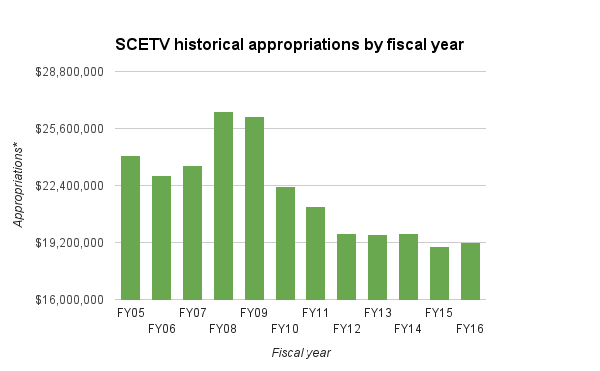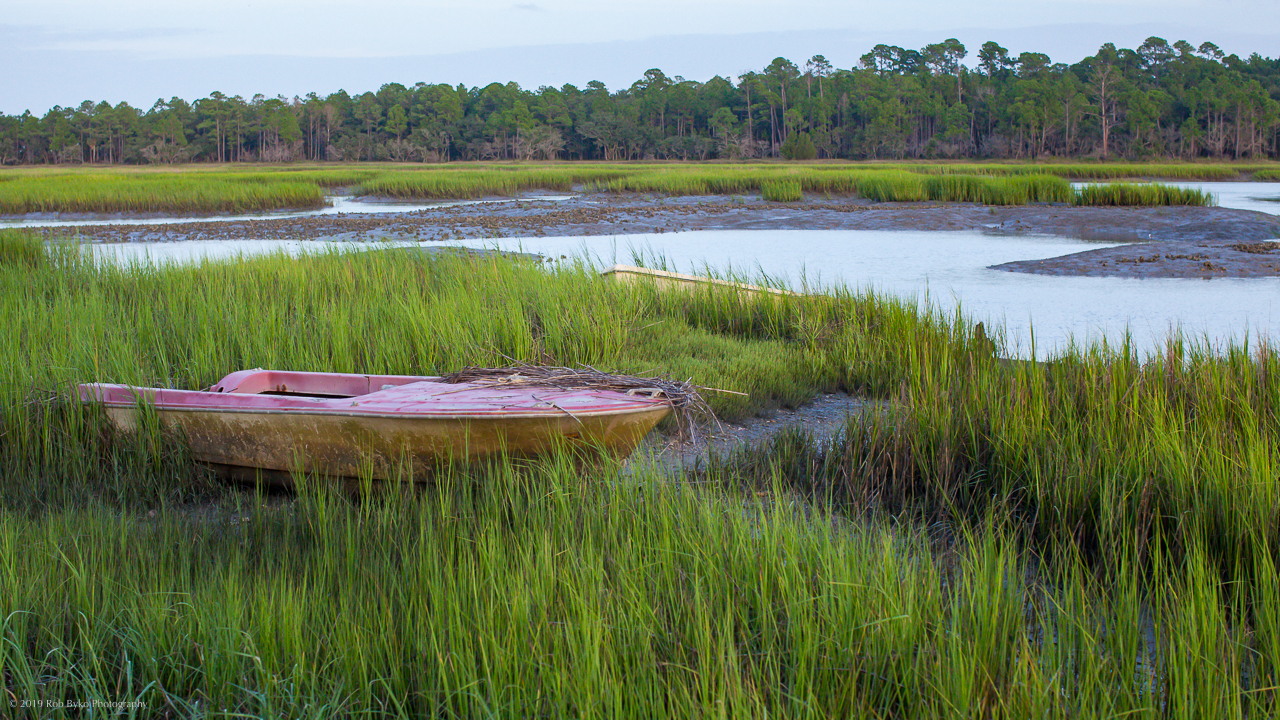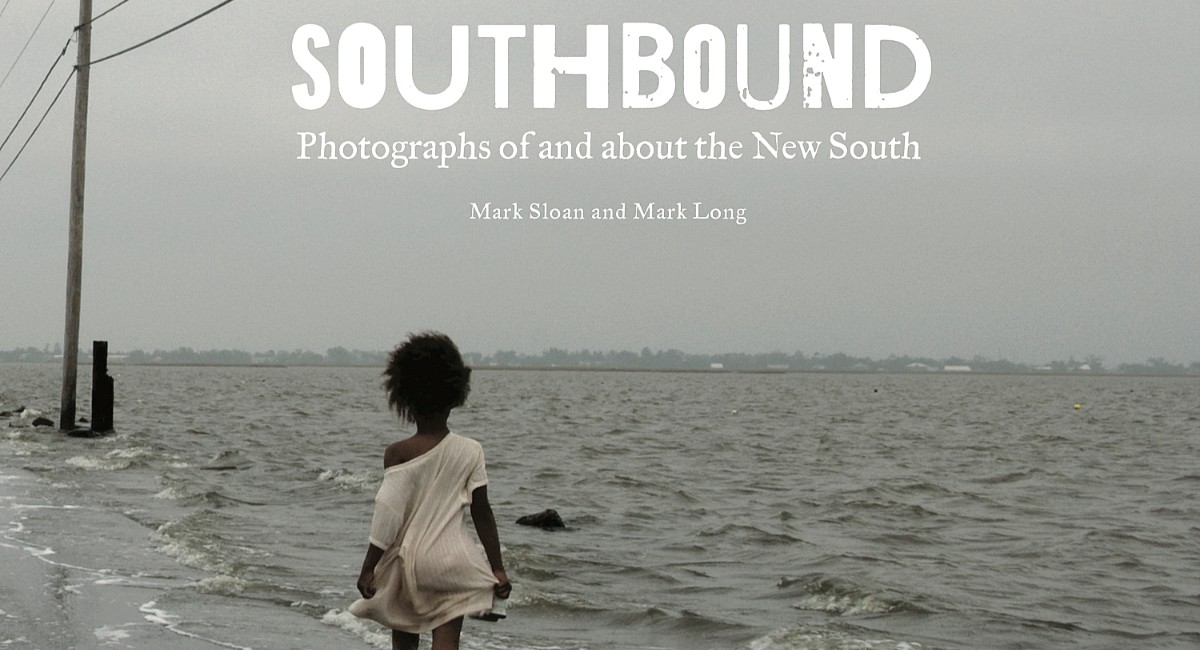Charleston Currents #11.45 | Sept. 30, 2019
WEATHERED. Mother Nature is starting to weather this skiff bogged down in the marsh along the South Carolina coastline. Photo by Rob Byko, contributing photographer.
 FOCUS: Halsey Institute’s Southbound wins national $25,000 award
FOCUS: Halsey Institute’s Southbound wins national $25,000 award
BRACK: Drama on television is fine, but not by SCETV board
IN THE SPOTLIGHT: Titan Termite & Pest Control
GOOD NEWS: $1.2 million goes to Gullah Geechee preservation projects
FEEDBACK: Another Charleston first
MYSTERY PHOTO: Colorful building
S.C. ENCYCLOPEDIA: Blue granite
CALENDAR: Yikes! The Democrats are coming
Halsey Institute’s Southbound wins national $25,000 award
Staff reports | A 2018 book of photographs of the South by the Halsey Institute of Contemporary Art at the College of Charleston has won the 2019 Alice Award, a $25,000 prize given annually by Furthermore to a richly-illustrated book that “makes a valuable contribution to its field and demonstrates high standards of production.”
![]() The book, Southbound: Photographs of and about the New South, accompanied the Halsey Institute’s 2018 exhibition of the same name. The book was edited and included an introduction by the exhibition curators, Mark Sloan and Mark Long, and designed by Gil Shuler Graphic Design. The catalogue contains contributions by Nikky Finney, Eleanor Heartney, William Ferris, John T. Edge and Rick Bunch. The Southbound project comprises 56 photographers’ visions of the South over the first decades of the 21st century. The photographs are accompanied by stories that provide the reader with a sense of place.
The book, Southbound: Photographs of and about the New South, accompanied the Halsey Institute’s 2018 exhibition of the same name. The book was edited and included an introduction by the exhibition curators, Mark Sloan and Mark Long, and designed by Gil Shuler Graphic Design. The catalogue contains contributions by Nikky Finney, Eleanor Heartney, William Ferris, John T. Edge and Rick Bunch. The Southbound project comprises 56 photographers’ visions of the South over the first decades of the 21st century. The photographs are accompanied by stories that provide the reader with a sense of place.
“We are thrilled to be in the company of The Getty [Museum] and the Block Museum of Art of Northwestern University,” said Sloan, the Halsey’s director and chief curator. “The selection of the Southbound catalogue as the overall winner 2019 Alice Award is one of the greatest distinctions we have received in our 25 years of publishing. We are proud of the interdisciplinary nature of the Southbound project and how that is reflected in the publication.”
The exhibition is on tour. It recently opened at the Gregg Museum of Art & Design in Raleigh, N.C., and at Duke University’s Power Plant Gallery in neighboring Durham. It will remain on the road through 2021 with stops in Chattanooga; Meridian, Miss.; Baton Rouge; Lake City, S.C.; and Conway, Ark.
“The Southbound photographs open a window onto our relationship with place, a fundamental part of the human condition,” said Southbound co-curator Mark Long. “The Alice Award recognizes the startling, beautiful and thought-provoking work of the artists involved; but it also acknowledges the complexity of place that necessitates the perspectives, too, of historians, folklorists, critics, geographers, and poets. Perhaps the most exciting thing about the catalogue is how it will allow the ideas and images at the heart of Southbound to echo forward long after the travelling exhibition ends, and the imprimatur of the Alice Award will be invaluable in that sense.”
An awards event at the Strand Bookstore in New York City will be held Oct. 28, 2019.
- Click here to learn more about the Southbound project.
- Have a comment? Send to: editor@charlestoncurrents.com
BRACK: Drama on television is fine, but not by SCETV board
NOTE: This article first was published Friday in Statehouse Report.
By Andy Brack, editor and publisher | There’s been more drama recently among S.C. Education Television leaders than on Downton Abbey.
 The chairman of SCETV and two others resigned this week after months of scheming to try to get more money from the nonprofit endowment that has pumped in millions of dollars to ensure South Carolinians get high-quality public programs.
The chairman of SCETV and two others resigned this week after months of scheming to try to get more money from the nonprofit endowment that has pumped in millions of dollars to ensure South Carolinians get high-quality public programs.
It’s downright pitiful what’s been going on and three cheers go to Gov. Henry McMaster for protecting public television, which we’ve described in the past as a blessing and a gem.
Public broadcasting got its start in South Carolina in the late 1950s as an economic teaching medium to help unskilled workers get more skills and, as a result, boost their family incomes. As it blossomed into a public network, the ETV Endowment of South Carolina started in November 1977 to provide much-needed money for quality public television and radio programming. In just the last three years, for example, the Endowment has given more than $13.2 million in unrestricted programming support to SCETV. Only $4.5 million of the total was raised through on-air fundraising, according to the Endowment.
 A few years ago, Gov. Nikki Haley tried to zero out state funding for the network. She wasn’t completely successful because state legislators changed how the network got state funds. Instead of large direct appropriations, it moved to an indirect appropriation model in which broadcast services were reimbursed through the new Department of Administration. In 2005, for example, the agency received $12.7 million directly from state lawmakers and had a total budget of $24.1 million. By comparison, the network’s state budget in 2016 was just $277,532, although it generated millions more through services and pass-throughs for a total public budget of $19.2 million.
A few years ago, Gov. Nikki Haley tried to zero out state funding for the network. She wasn’t completely successful because state legislators changed how the network got state funds. Instead of large direct appropriations, it moved to an indirect appropriation model in which broadcast services were reimbursed through the new Department of Administration. In 2005, for example, the agency received $12.7 million directly from state lawmakers and had a total budget of $24.1 million. By comparison, the network’s state budget in 2016 was just $277,532, although it generated millions more through services and pass-throughs for a total public budget of $19.2 million.
Fast forward to mid-2018, when Haley-appointed sharks still on the SCETV Commission started churning the funding waters with relatively new SCETV President and CEO Anthony Padgett. By February of this year, board minutes reflect they hatched a plan to try to siphon off more Endowment money so the partnership would be “modernized and codified.”
By March, the funding putsch was on full display as Haley holdovers on the commission pushed through a resolution [see March minutes here] that said SCETV “must maintain complete, accurate and secure records of all uses of donor information and must maintain active control of donor lists …”
In other words, they wanted control. They wanted to use Endowment donor records and start their own fund-raising efforts, which would have crippled the successful Endowment and, to say the least, confused donors. The sharks even threatened lawsuits and institutional retribution in what one attorney described as “an aggressive effort to gain substantial control over the Foundation’s funds in order to use them in support of ETV in a much broader fashion than is contemplated by the ETV Foundation’s charter.”
Then came a point where everything might have just gone too far. According to a July letter apparently sent in September to the Endowment’s director, then-SCETV Board Chair Brent Nelsen of Greenville had the audacity to ask the Endowment to provide a $21,527 bump to Padgett’s pay “for exemplary performance over the past year and to help ensure retention.” Currently, he earns $173,800 from the state. Really? Reward someone for plotting against you?
 By the commission’s Sept. 18 meeting, McMaster had filled a couple of vacancies on the SCETV Commission with folks who understood the historic relationship with the Endowment. Power on the agency’s board shifted away from Padgett and Haley’s appointees. The new members stopped the whole nonsense in its tracks by helping to rescind a detrimental and orchestrated March resolution designed to hurt the Endowment.
By the commission’s Sept. 18 meeting, McMaster had filled a couple of vacancies on the SCETV Commission with folks who understood the historic relationship with the Endowment. Power on the agency’s board shifted away from Padgett and Haley’s appointees. The new members stopped the whole nonsense in its tracks by helping to rescind a detrimental and orchestrated March resolution designed to hurt the Endowment.
Padgett, obviously now worried about his job, has started singing another tune. In his September president’s report, he outlined how the very efforts in which he had been engaged were “divisive and distracting to both organizations. Given our history and long-standing relationship with the ETV Endowment, and their support, we have decided that it is best to focus on what helps us build our organizations, rather than what divides us.”
In recent days, Nelsen and two other Haley appointees resigned, employing full-fledged Trumpian language in an op-ed that talked about draining swamps and other nonsense.
It’s good they’re gone. Now, maybe it’s time for Padgett to start looking for another job. SCETV needs leadership that embraces the Endowment, not that conspires against it.
Andy Brack’s latest book, “We Can Do Better, South Carolina,” is now available in paperback and for Kindle via Amazon.
- Have a comment? Send to: editor@charlestoncurrents.com
SPOTLIGHT: Titan Termite & Pest Control
 Titan Termite & Pest Control, headquartered in Charleston, is a full service residential, commercial and industrial pest control company serving South Carolina. It is a third-generation, family-owned company known for outstanding customer service. Each associate is dedicated to the customer and exhibits integrity and respect. Titan’s pest professionals can assist your commercial or residential location with general pest control, termite inspections, termite control, flea control, bed bug extermination, ant control and more. Titan Termite and Pest Control continues to set high standards so that its customers receive the best possible service. Titan’s technicians are knowledgeable of the latest in pest control techniques, which enables the company to customize effective treatment plans for every situation.
Titan Termite & Pest Control, headquartered in Charleston, is a full service residential, commercial and industrial pest control company serving South Carolina. It is a third-generation, family-owned company known for outstanding customer service. Each associate is dedicated to the customer and exhibits integrity and respect. Titan’s pest professionals can assist your commercial or residential location with general pest control, termite inspections, termite control, flea control, bed bug extermination, ant control and more. Titan Termite and Pest Control continues to set high standards so that its customers receive the best possible service. Titan’s technicians are knowledgeable of the latest in pest control techniques, which enables the company to customize effective treatment plans for every situation.
- Free estimate: 888-794-5603.
- Contact Titan online.
- To meet all of our underwriters, click here.
$1.2 million goes to Gullah Geechee preservation projects
Staff reports | The director of a commission to preserve Gullah Geechee heritage says she is thankful (“t’engkful” in Gullah) for more than $1 million awarded over the last month to keep the culture alive in South Carolina, Georgia and Florida.
“This federal funding provides critical — and substantial — cornerstone resources our communities need to help finance and move forward major projects to document, preserve and share a more complete story of the Gullah Geechee while protecting endangered, heritage sites,” said Heather Hodges, executive director of the Gullah Geechee Cultural Heritage Corridor.
“The immense contributions to the U.S. civil rights movement of the Gullah Geechee people on James, Johns and Wadmalaw Islands are still widely unknown, even in South Carolina. Museums can’t share all of this South Carolina and U.S. history. Continued investment in the preservation of the actual, historic sites is necessary.”
On James Island, for example, community members and the Historic Charleston Foundation recently received $490,861 from the African American Civil Rights Grant Program to revitalize the Pine Tree Hotel in the historic Mosquito Beach District. During segregation, Gullah Geechee community members were unable to use nearby Folly Beach and, instead, turned “Mosquito Beach” on King Flats Creek in the historic Sol Legare neighborhood into a popular waterfront destination. The entire district was recently nominated to the National Register of Historic Places.
In Georgia, the corridor has partnered with Cumberland Island National Seashore Park on a two-year, $200,000 project to better document and interpret the lives of the African and Gullah Geechee men, women and children who once lived on the island. And a St. Augustine, Fla., cultural center in a historic high school recently got a $500,000 federal grant for building repairs.
Other recent news stories of note:
![]() Parks and Recreation. The Charleston County Park and Recreation Commission (CCPRC) continues to be among the elite park and recreation agencies in the country as evidenced in competing a five-year national re-accreditation process. CPRC Executive Director David Bennett said re-accreditation, received in a September national conference, “embodies our vision to be distinguished as a nationally accredited and financially sustainable park and recreation agency through our commitment to preserving our natural, historical and cultural resources, and offering a clean, safe and exceptional visitor experience that is accessible to all.”
Parks and Recreation. The Charleston County Park and Recreation Commission (CCPRC) continues to be among the elite park and recreation agencies in the country as evidenced in competing a five-year national re-accreditation process. CPRC Executive Director David Bennett said re-accreditation, received in a September national conference, “embodies our vision to be distinguished as a nationally accredited and financially sustainable park and recreation agency through our commitment to preserving our natural, historical and cultural resources, and offering a clean, safe and exceptional visitor experience that is accessible to all.”
Big anti-opioid grant to MUSC. The Medical University of South Carolina (MUSC) has received an $833,190 grant from Helping to End Addiction Long-term, or the NIH HEAL Initiative. The MUSC award is one of 375 grant awards across 41 states made by the National Institutes of Health in fiscal year 2019 to apply scientific solutions to reverse the national opioid crisis. The grant will run for a one-year period. “Through this award, MUSC investigators will join a national network of researchers exploring innovative treatments for chronic pain,” said Dr. Kathleen Brady, MUSC vice president for research. “Our goal is to make these state-of-the-art pain treatments available to benefit the citizens of South Carolina.”
New tax payment website. Charleston County residents have access to a new tax payment website providing taxpayers better navigation, new options and lower costs to use a credit card for payment. “We have been working hard over the last two years to make the online tax system’s search function easier to use and more accurate, as well as reduce any additional cost for the convenience of paying online,” said Charleston County Treasurer Mary Tinkler. “I am particularly excited about the e-check feature, a new and free online option for taxpayers.”
Children in high poverty. Some 130,000 South Carolina children live in concentrated poverty now. While that’s 18,000 fewer children in high poverty than five years earlier, 12 percent of our kids — about one in eight children — remain in high poverty areas, according to new data from the Annie E. Casey Foundation. The U.S. Census Bureau’s data snapshot of children living in high poverty , was released this week by S.C. Children’s Trust, which along with state agencies, coordinates with South Carolina Child Well-Being Coalition. More from Statehouse Report.
- Have a comment? Send to: editor@charlestoncurrents.com
Another Charleston first
To the editor:
![]() Another Charleston First is the First Memorial Day in America, held around the old racecourse at what is now Hampton Park and organized by the African-American churches and the Freedmen’s Bureau.
Another Charleston First is the First Memorial Day in America, held around the old racecourse at what is now Hampton Park and organized by the African-American churches and the Freedmen’s Bureau.
Three thousand school children and 7,000 free persons of color and recently-emancipated slave marched on May 1, 1865. David Blight and other historians have confirmed this as factual and a plaque serves to commemorate the event near the parking lot in the park.
More information is available from the Charleston Horticultural Society in their publication ”Layers of the Landscape at Hampton Park.”
— Judy Hines, Charleston, S.C.
Send us your thoughts
We’d love to get your impact in one or more ways:
Send us a letter: We love hearing from readers. Comments are limited to 250 words or less. Please include your name and contact information. Send your letters to: editor@charlestoncurrents.com. | Read our feedback policy.
Tell us what you love about the Lowcountry. Send a short comment – 100 words to 150 words – that describes something you really enjoy about the Lowcountry. It can be big or small. It can be a place, a thing or something you see. It might the bakery where you get a morning croissant or a business or government entity doing a good job. We’ll highlight your entry in a coming issue of Charleston Currents. We look forward to hearing from you.
Colorful building
Where is this colorful building in Charleston County? Send your guess to: editor@charlestoncurrents.com. And don’t forget to include your name and the town in which you live.
Our previous Mystery Photo
 Our Sept. 23 mystery, “Where is this bike parked?” got correct answers from all over. The bike, as many knew, was outside the College Park baseball stadium at the corner of Rutledge and Francis streets. Look closely and you can see some of the blue and red doves painted in the Charleston Strong campaign.
Our Sept. 23 mystery, “Where is this bike parked?” got correct answers from all over. The bike, as many knew, was outside the College Park baseball stadium at the corner of Rutledge and Francis streets. Look closely and you can see some of the blue and red doves painted in the Charleston Strong campaign.
Hats off to these readers who knew the answer: Legare Clement, Todd Chas, Jack Bass, Joe Mendelsohn, George Baker and Mike Dodd, all of Charleston; Chris Brooks and Marie Annand, both of Mount Pleasant; Chuck Boyd of Hanahan; Charlie Morrison of James Island; Stephanie Chomos of Summerville; Heyward Baker of Kingstree; George Graf of Palmyra, Va.; and Durant Petit and Wendell Maxwell.
Graf shared that Rutledge Avenue “gets its name from the Rutledge family, which called the Charleston area home. The thoroughfare pays homage in particular to Edward Rutledge, a Revolutionary and, at age 26, a signer of the Declaration of Independence. I could not find the origin of Francis Street, but maybe it was named after Francis Marion, the Swamp Fox, but I could not find any mentions of this street being named for him.”
- Send us a mystery: If you have a photo that you believe will stump readers, send it along (but make sure to tell us what it is because it may stump us too!) Send it along to editor@charlestoncurrents.com.
HISTORY: Blue granite
S.C. Encyclopedia | Blue granite was designated the state stone by a law approved by Gov. Robert McNair on June 24, 1969. Legislators declared that “the blue granite stone of this State has been widely used to beautify all areas of South Carolina.” The state is famed for Winnsboro blue granite, which was quarried for many years in Fairfield County. The stone is of light blue color and contains particles of mica, feldspar and quartz. It is much prized in construction and decoration.
Granite is a coarse-grained igneous stone produced by slow cooling and solidification of molten rock. Winnsboro blue has been used in the construction of churches, houses, gravestones, and fence posts since the early nineteenth century. The Winnsboro Granite Company quarried and shipped the “beautiful blue” for many years, and the stone acquired national renown as “the silk of the trade.” It has been used in such structures as New York City’s Flat-Iron Building, the old Charleston Post Office, and the great dry dock of the Charleston Naval Shipyard. It was used for the Jean Ribaut Monument at the U.S. Marine Corps Depot at Parris Island and for Charleston’s John C. Calhoun Monument. The Fairfield granites won a medal and diploma at the World’s Columbian Exposition in 1893.
After Winnsboro blue was no longer quarried in South Carolina, stocks still remained in the state, and the stone was still found in Elberton, Georgia. In 2002 the Willis Dimension Stone Company of Elberton donated Winnsboro blue to Shaw Air Force Base to be used for a monument to firefighters who served at New York City’s “Ground Zero” on September 11, 2001.
— Excerpted from an entry by David C.R. Heisser. This entry may not have been updated since 2006. To read more about this or 2,000 other entries about South Carolina, check out The South Carolina Encyclopedia, published in 2006 by USC Press. (Information used by permission.)
CALENDAR: Yikes! The Democrats are coming!
Staff reports | Yikes! There will be more presidential candidates in town on Oct. 5 than you can shake a stick at.
![]() The Charleston County Democratic Party on Saturday will host its Blue Jamboree at The Bend on Azalea Drive in North Charleston. More than 2,000 tickets have been sold for this all-day event that will feature a broad array of Democratic presidential candidates.
The Charleston County Democratic Party on Saturday will host its Blue Jamboree at The Bend on Azalea Drive in North Charleston. More than 2,000 tickets have been sold for this all-day event that will feature a broad array of Democratic presidential candidates.
Sponsors of the event include these presidential candidates: Kamala Harris, Joe Biden, Bernie Sanders, Elizabeth Warren, Tom Steyer, Cory Booker, Andrew Yang, Pete Buttigieg, Michael Bennet, Tulsi Gabbard and Julian Castro.
Also on the calendar:
![]() Community Day at Dill Sanctuary: 10 a.m. to 2 p.m. Oct. 5. You can get a free look at this protected land protected through the Charleston Museum during four hours of activities and tours. Location: 1163 Riverland Drive on James Island. No pets. More info: visit CharlestonMuseum.org.
Community Day at Dill Sanctuary: 10 a.m. to 2 p.m. Oct. 5. You can get a free look at this protected land protected through the Charleston Museum during four hours of activities and tours. Location: 1163 Riverland Drive on James Island. No pets. More info: visit CharlestonMuseum.org.
Black Ink: 11 a.m. to 5 p.m., Oct. 5, Memminger Auditorium, 56 Beaufain St., Charleston. Black Ink, Charleston’s African-American book festival, will feature world-renowned poet and educator Nikki Giovanni as keynote speaker at 2 p.m. It is an exciting program of Charleston Friends of the LIbrary and a part of the MOJA Arts Festival. Cost: More info.
Makers Market: 11 a.m. to 4 p.m., Oct. 5, Baker and Brewer, 94 Stuart St., Charleston. Admission is free to the event that begins with live music apply online by Red Cedar Review, followed by Seitu Solomon Steelpan will take the afternoon stage and Matadero Band. Music ends at 9 p.m. Interested vendors may apply online. A portion of the vending fees benefit Charleston Pro Bono Legal Services.
Rally and walk for horses: 11 a.m., Oct. 5, starting at the steps of the U.S. Custom House on East Bay Street, Charleston. Charleston Carriage Horse Advocates will hold this peaceful rally and walk to to advocate for humane working conditions for carriage animals.
Coming to the Gaillard. Check out these awesome coming events at the Charleston Gaillard Center, 95 Calhoun St., Charleston:
The Most Reluctant Convert: 4 p.m., Oct. 6, Charleston Gaillard Center. Award-winning actor Max McLean will bring to life author C.S. Lewis in his own words in this “hugely moving” and “highly-entertaining” drama. To learn more and get tickets, visit CSLewisOnStage.com or phone 843.242.3099.
Chick Corea Trilogy: 7:30 p.m., Oct. 29, Charleston Gaillard Center. Chick Corea brings together bass powerhouse Christian McBride and drum master Brian Blade in a trio that earned 2 Grammy Awards for their first outing, 2014’s landmark 3-CD set Trilogy. “Both are master musicians and together we have an easy rapport,” Chick says of McBride and Blade. “There is a lot of give and take in our music. It’s always a lot of fun.” Tickets are $36 to $86.
Wild Side celebration: 5:30 p.m. to 9 p.m., Oct. 12, Kaminski House, 1003 Front St, Georgetown, S.C. The S.C. Environmental Law Project will pay homage in its 10th annual Wild Side to the state’s Watersheds, Ocean, Wetlands — the WOW of South Carolina — as well as other milestones. Cost: $100 per adult. Learn more.
Free Verse Festival: Oct. 13-20 in locations around Charleston with a special event Oct. 28. The third year of the Free Verse Festival, Charleston’s first poetry festival, seeks “to uplift the community by providing eclectic poetry events and workshops at multiple venues in downtown and West Ashley.” Learn more online.
Latin American Festival: Oct. 13, Wannamaker County Park, North Charleston. The 28th annual festival will allow friends and family members to relish authentic Latin American music, art, food and children’s activities, all inspired by cultures from around the globe. Non-stop music will include everything from the beats of merengue, to reggaeton, bachata and salsa. All ages are invited to salsa to Latin rhythms by six-piece band Furia Tropikal from 1 – 2 p.m. Dance along with the Charlotte-based 12-piece band Orquesta Mayor from 3:30 – 4:30 p.m., and end the day with the Dominican merengue phenomenon El Rey Tulile from 4:30 – 6 p.m. Cost: $10. No outside food, alcohol or coolers permitted. No dogs allowed. For more information, call (843) 795-4386 or visit CharlestonCountyParks.com.
AFFA Gala 2019: 6 p.m., Nov. 1, The Cedar Room, 701 East Bay St., Charleston. You can have one of the best nights of the year with this annual fund-raiser for AFFA that is replete with a cocktail hour, silent auction, dinner, live auction and entertainment by the Emerald Empire Band. Tickets: $180. Learn more now.
Early morning bird walks at Caw Caw: 8:30 a.m. every Wednesday and Saturday, Caw Caw Interpretive Center, Ravenel. You can learn about habitats and birds, butterflies and other organisms in this two-hour session. Registration is not required, but participants are to be 15 and up. $10 per person or free to Gold Pass holders. More: http://www.CharlestonCountyParks.com.
AREA MARKETS
WEDNESDAYS. The West Ashley Farmers Market is every Wednesday from 3 p.m. to 7 p.m. in Ackerman Park off Sycamore Avenue in West Ashley. The last week of the market will be the first week of October. More.
FRIDAYS/SATURDAYS: Night Market. Every Friday and Saturday from 6:30 p.m. to 10:30 p.m. for the rest of the year, you can shop with 108 vendors, including artists and craftsmen, at the night market on Market Street between East Bay and Church streets. It’s more than four blocks of local shopping and fun. Free.
SATURDAYS: Johns Island Farmers Market operates each Saturday from 9:30 a.m. to 1:30 p.m. year-round with more than 50 local farmers and vendors, food trucks, music and more. The market is located on the campus of Charleston Collegiate School, 2024 Academy Road, Johns Island
SATURDAYS: The Charleston Farmers Market is open 8 a.m. to 2 p.m. in Marion Square each Saturday through Nov. 30. More info.
NOTE: The Mount Pleasant Farmers Market weekly market on Tuesdays finished in September. The next opportunity to shop is a special Dec. 7 holiday market and craft show at the market pavillion at Moultrie Middle School, 645 Coleman Blvd., Mount Pleasant. Time: 11 a.m to 4 p.m. Free parking. Lots of activities. More info.
- If you have an event to list on our calendar, please send it to feedback@charlestoncurrents.com for consideration. The calendar is updated weekly on Mondays.
 If you like what you’ve been reading, how about considering a contribution so that we can continue to provide you with good news about Charleston and the Lowcountry. Interested? Just click the image below.
If you like what you’ve been reading, how about considering a contribution so that we can continue to provide you with good news about Charleston and the Lowcountry. Interested? Just click the image below.
OUR UNDERWRITERS
Charleston Currents is an underwriter-supported weekly online journal of good news about the Charleston area and Lowcountry of South Carolina.
- Meet our underwriters
- To learn more about how your organization or business can benefit, click here to contact us. Or give us a holler on the phone at: 843.670.3996.
OUR TEAM
Charleston Currents offers insightful community comment and good news on events each week. It cuts through the information clutter to offer the best of what’s happening locally.
- Mailing address: P.O. Box. 22261 | Charleston, SC 29413
- Phone: 843.670.3996
Charleston Currents is provided to you weekly by:
- Editor and publisher: Andy Brack, 843.670.3996
- Contributing editor, common good, Fred Palm
- Contributing editor, money: Kyra Morris
- Contributing editor, Palmetto Poem: Marjory Wentworth
- Contributing editor, real estate: Digit Matheny
- Contributing photographer: Rob Byko
SUBSCRIBE FOR FREE
Subscriptions to Charleston Currents are free.
- Click here to subscribe.
- Unsubscribe. We don’t want to lose you as a reader of Charleston Currents, but if you must unsubscribe, you will have to do it through the email edition you receive. Just go to the bottom of any of your weekly newsletters and click the “unsubscribe” function. If that doesn’t work, please send us an email with the word “unsubscribe” in the subject line.
- © 2008-2019, Statehouse Report, LLC. All rights reserved. Charleston Currents is published every Monday by Statehouse Report LLC, PO Box 22261, Charleston, SC 29413.









 We Can Do Better, South Carolina!
We Can Do Better, South Carolina!























